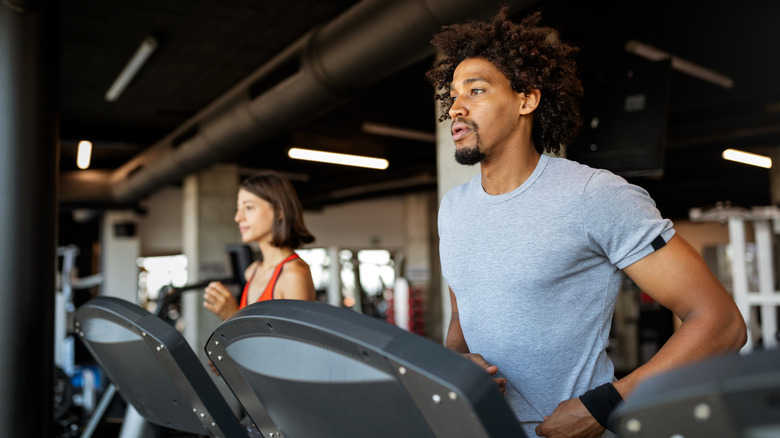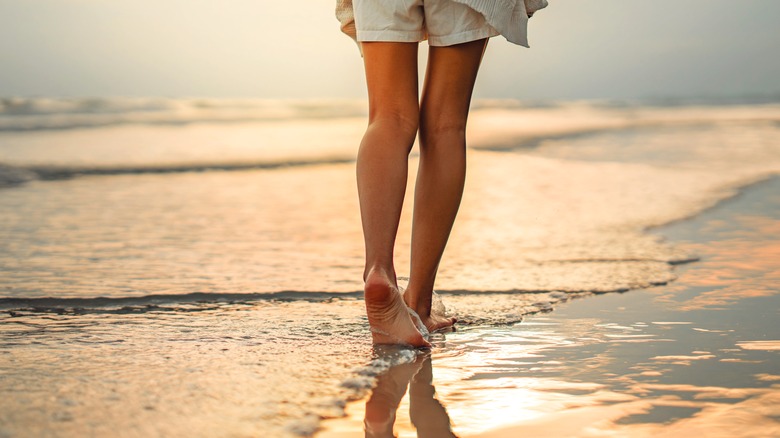Here's What Jennifer Aniston Does After A Long Flight That She Swears Beats Jet Lag
Jennifer Aniston, arguably one of the most recognizable faces in Hollywood ever since she starred in the beloved '90s sitcom "Friends," loves to travel. And she doesn't just travel for work — she travels to get away from work too. "I think after next week I'm going to take June and July off," Aniston told People in a 2023 interview. "I've never done that, but I really think I'm going to do it. I'm going to travel because I haven't really since the pandemic."
Even if the COVID-19 pandemic temporarily interrupted the actor's travel plans, she's had plenty of experience hopping on planes and exploring faraway places (look to her Netflix movie "Murder Mystery," released just before the pandemic and shot in Italy, as one example). That means Aniston has also learned to navigate the dreaded jet lag that comes with skipping multiple time zones. When asked by Yahoo! Health how she overcomes jet lag, the celebrity revealed, "When you land after a long, long flight, go hit the gym and do a 30-minute run. It has worked for me — when I've actually had the energy to go and do it!"
Does the tip work?
Hopping off of a long flight and going for a run might not be the easiest hack for beating jet lag — especially if you're already exhausted from traveling — but there's some evidence that it may actually work. "Exercise plays a major role in helping to prepare and acclimatise across all three stages of pre, during and post travel," Papillon Luck, an expert on jet lag and the founder of travel vitamin brand 15th Degree, told Metro. "Exercise helps regulate the body's temperature, which is another way for our circadian rhythms to re-adjust."
A 2019 study published in The Journal of Physiology backed up some of these claims. The study discovered that a workout can recalibrate a wonky circadian rhythm (caused by long-distance travel, for instance). However, you should time your run carefully to avoid worsening your jet lag. The researchers concluded that exercising earlier in the day — at 7 a.m. or between 1 p.m. and 4 p.m. — moved the circadian rhythm to an earlier time (helping you to sleep and wake up earlier) while exercising in the evening between 7 p.m. and 10 p.m. was likely to delay the circadian rhythm (causing you to sleep and wake up later).
If you can't run, try walking instead — barefoot
If you're not much of a runner, walking may be enough to reap the benefits of Jennifer Aniston's tip. However, you should consider making one adjustment: Remember to take off your shoes first. It might sound unconventional, but walking barefoot — also known as "grounding" or "earthing" — is thought to stave off the effects of jet lag. Model Miranda Kerr and British actor Naomie Harris are just a couple of the celebrities who swear by the technique.
One of earthing's biggest proponents is biohacker Dave Asprey. He told Well+Good about a time when he sidestepped jet lag by doing yoga outside. "I was like, 'Yes! Exercise in the morning works [to overcome jet lag],'" he said. "But the next time I went, [I exercised indoors] and it didn't work. The difference is this: When I did yoga in the park, I was barefoot and touching the soil with my hands and my feet. It was only after the research on earthing came out a couple years later that I was able to make that connection." One example of such research is a 2012 study published in the Journal of Environmental and Public Health, which stated that walking barefoot to reconnect with the Earth's electrons improves sleep and promotes overall well-being.
You may not want to do all your sightseeing without shoes, but a brief walk in a park or on the beach might do the trick.


